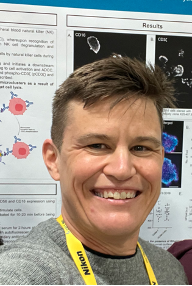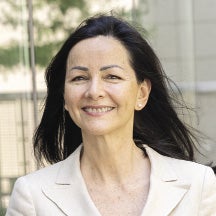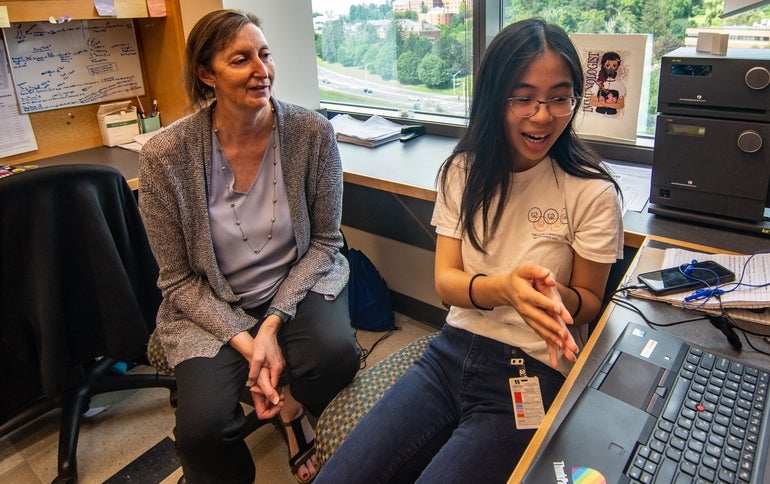Mary Munson, a UMass Chan Medical School professor, is an accomplished scientist and a champion for women in science.
Get Instant Access to This Article
Subscribe to Worcester Business Journal and get immediate access to all of our subscriber-only content and much more.
- Critical Central Massachusetts business news updated daily.
- Immediate access to all subscriber-only content on our website.
- Bi-weekly print or digital editions of our award-winning publication.
- Special bonus issues like the WBJ Book of Lists.
- Exclusive ticket prize draws for our in-person events.
Click here to purchase a paywall bypass link for this article.
Mary Munson started her research career in a laboratory at the same time as two more outgoing male scientists. She eventually realized being the quiet one wouldn’t do her any favors.
“I had to step up and promote myself,” she said.
Munson, a UMass Chan Medical School professor and vice chair of diversity for the biochemistry and molecular biotechnology department, is an accomplished scientist, elected in July as president of the American Society for Cell Biology, a professional association with membership of more than 7,000. She is a champion for women in science, and, increasingly, for diversity in science and academia.
The kind of verbal, outspoken self-promotion necessary to make a name in the scientific research community didn’t come naturally to Munson. She was brought up with the generation of women who were taught to be seen but not heard, she said, which made it a challenge to buck the norms as a female scientist.
What did come naturally to Munson was her collaborative style. It’s something she has always embraced in research, and it serves her as she dedicates her resources anew to championing diversity, equity, and inclusion initiatives across her myriad positions in the scientific community.
“It’s stereotypical that women are more collaborative and do more teamwork, but I fit that. I'm collaborative. I want to know the answer and how things work. I’m driven by that, not competition,” she said.
Promoting others
That attitude means sometimes she receives less credit, she said, but it makes the science better and the answers clearer. Her emphasis on collaboration over competition has fueled Munson to be a mentor for other scientists since the start of her career.

She excels at mentoring, said Emily Mace, assistant professor at the Columbia University Irving Medical Center in New York City and co-chair of the ASCB’s Women in Cell Biology Committee with Munson.
“Mary really exemplifies the value of [mentorship],” said Mace. “Many of us have come to benefit from Mary's mentoring as colleagues or trainees.”
As she learned to promote herself, she realized she was in a position to promote others, too.
Munson worked at UMass Chan for more than two decades and has solidly established herself at the university. She does not take the responsibilities of that leadership position lightly.
“I’m totally enamored with the idea that as senior faculty we have the power to make change,” she said.
Following the 2020 police murder of George Floyd, as conversations about racial justice in America came to the forefront in nearly every industry, Munson – as a tenured professor – felt empowered to step up.
“I realized I was in a position where I could do better, where I could do more,” said Munson.

Furthering diversity
The Women in Cell Biology Committee celebrated its 50th anniversary in 2021. While the occasion signaled a great deal of progress, it was clear there was still a long way to go and a need for a new focus extending past largely addressing white womens’ issues, said Munson.
“It was time to be more thoughtful and more intersectional,” Munson said.
Much of what she has learned over the years as an advocate for women in science can be applied to other marginalized groups, in Munson’s perspective. With that background, she felt called to step up, not just at the ACSB but at UMass Chan, too. For the past three years, Munson has taken on increasing responsibilities related to equity at UMass Chan.
Ensuring the work gets done is her priority. While recognition has come in the form of a 2022 UMass Chan Chancellor's Award for advancing institutional excellence in diversity and inclusion, the way she began and approached the work makes clear adding a line to her CV is secondary to making tangible change for scientists from marginalized backgrounds.
For two years, Munson collaborated with and supported the office of health equity even before she was given an official role and title, said Milagros Rosal, vice provost for health equity at UMass Chan. Rosal is the inaugural leader in that position, which was created in September 2020.

Munson was the first faculty member to reach out to her to get involved, Rosal said.
“Time is very valuable for everyone in academia, and there she was offering her time and ability to improve the efforts,” Rosal said.
Munson was subsequently appointed assistant vice provost for health equity in the office, which has three arms. One focuses on facilitating unbiased faculty recruitment, one on equitable advancement of junior faculty into leadership positions, and one looking outward at how the university can leverage resources to promote health globally.
Munson’s attention has been not only on promoting the hiring of candidates from marginalized groups, but fostering their growth and experience at UMass Chan. On the ladder of seniority in academia, the higher levels become less diverse. It’s in part because the system was not designed for people who don’t come from the traditional background, said Munson.
“How do we ensure the folks we hire are able to thrive here?” Munson asks.
Munson’s plate is full with her commitments at UMass, ASCB, and for the long list of mentees she has cultivated in her career. None of them are in isolation from each other, however.
“A lot of these things came together for me at the same time. It’s all thinking about how to be intersectional. It’s thinking about how we change the process and the system,” she said.
Her commitment to furthering diversity and inclusion efforts in the scientific community is forward looking, and it’s necessary to preserve academic research careers as a desirable option for anyone who is science-minded, curious, and committed, particularly people from backgrounds historically underrepresented and pushed to the margins.
“I'm afraid if we don't change the way we do science in academia, they might not want to be here,” Munson said.

